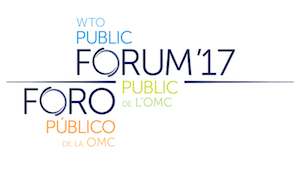Building for success: A world trade agenda for the Buenos Aires ministerial
28 Sep 2017 14:30h - 15:30h
Event report
[Read more session reports from WTO Public Forum 2017]
The panel addressed the question of, ‘How to advance trade liberalisation in the WTO 11th Ministerial Conference (MC11) amid the current protectionist mood?’ Ms Nicolle Graugnard, Senior Policy Manager, ICC, moderated the panel.
Mr John Danilovich, Secretary General, ICC, stated that it is vital now more than ever, for the business community to engage in a trade agenda based on rules and multilateralism. There are two ICC-led actions that offer opportunities in this direction. First, the ICC has been developing a set of initiatives to support micro, small, and medium sized enterprises (MSMEs) interested in trading internationally. Among them, the ICC WTO Small Business Champions initiative provides these MSMEs with a platform to benefit from the knowledge and networks of the global business community. Yesterday, Google submitted the first successful project. Second, the ICC’s first ever Business Day will be held in Buenos Aires on 12 December, alongside MC11. Co-sponsored by the Argentinian government, it will unite business leaders who believe in multilateral, rule-based trade.
Mr Stefano Bertasi, Executive Director, Policy and Business Practices, ICC presented the Building for success report , which the ICC commissioned from ECIPE last March. It can be seen as an exercise in context-setting. Looking at the WTO agenda from a broad perspective, it posits that trade and investment liberalisation are still proven ways to develop economies. The document begins by analysing elements of Doha’s ‘unfinished agenda’. Then, it breaks down the new issue of digital commerce, dedicating particular attention to the matter of cross-border data flow. It ends with a list of short-term policy recommendations that are potential deliverables for the MC11 in the following areas: agriculture, services, fisheries subsidies, e-commerce, investment and investment facilitation, and, finally, how to strengthen the WTO’s ‘third pillar’ (its function as a knowledge repository on trade).
Mr James Bacchus, Professor of Global Affairs and Director, Center for Global Economic and Environmental Opportunity, University of Central Florida and Global Fellow, Centre for International Governance Innovation, affirmed that advancing foreign direct investment (FDI) is as essential as advancing trade for attaining the sustainable development goals (SDGs). Since many of these objectives are linked to infrastructural work, governments will need the assistance of the private sector globally, and not just of domestic companies. In return, to commit funds to such projects, enterprises must be offered legal certainty through a framework of rules that protects them against unfair practices such as rent-seeking or national treatment.
Mr Ulf Pehrsson, Vice President, Government and Industry Relations, Ericsson, concentrated on three issues of digital commerce: the encroachment of ‘digital economy’ into other sectors, developments in liberalising trade and ICT policies, and cross-border data flow. First, interdependence between services is increasing, with goods constantly transformed into services. Although it happens faster in e-commerce than in other sectors, it is not a sectoral issue. Eventually, all sectors will experience this trend. Second, on the continuing liberalisation of digital trade, he emphasised that all countries can benefit from the 1996 Information Technology Agreement, including low-income countries. Citing Afghanistan and the Seychelles, Pehrsson conjectured that the promise of spurring development convinced them to sign it. Third, he maintained that, while security and privacy are legitimate reasons for preventing unfettered data transfers, some countries use them as a pretext to obtain economic advantages through data flow restrictions. Limitations to cross-border data transfers should be levied according to international trade principles, and the first step toward discussing the legitimacy of such measures would be to differentiate them. As Pehrsson put it, ‘all data cannot be seen as equal’. Parties must reach a compromise where privacy and security are upheld, but data flow is justly discriminated.
Mr Philippe Delleur, Senior Vice President, Public Affairs, Alstom, having partaken in the Uruguay round, interpreted the present discussion on services in light of that experience. Given the current mood, it is not surprising that the expectations have lowered since then. There are two complicating factors. First, services sectors are very different from one another, even within national borders. Services are progressively included in the global economy, and are augmenting the value-added of entire industries as a result. But general agreements set common rules, so to take specific actions, there is a need for specific rules. Second, regulations are more cumbersome than tariffs in services. The term is often synonymous with ‘national and people preferences’, and this is much more difficult to negotiate. Delleur outlined two aspects in which the MC11 would have to progress: regulation transparency and ‘reasonable application’, as ‘trade must be developed in a fair way among all competitors’.
The ensuing Q&A covered issues like the responsibility of businesses to protect human rights, and criticism of trade and FDI as harmful to LCDs. Furthermore, the role of ICC in fostering environmental protection and e-commerce was also discussed.
by Guilherme Cooper Vicente
Related topics
Related event

